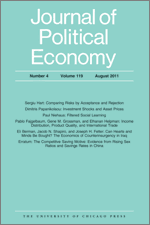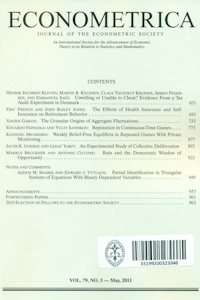
Antunes, A., Cavalcanti, T.V.D., Villamil, A.
The Effects of Credit Subsidies on Development
Economic Theory
Vol. 58 pp. 1-30 (2014)
Abstract: Under credit market imperfections, the marginal product of capital may not be equalized, resulting in misallocation and lower output. Preferential interest rate policies are often used to remedy the problem. This paper constructs a general equilibrium model with heterogeneous agents, imperfect enforcement and costly intermediation. Occupational choice and firm size are determined endogenously by an agent’s type (ability and net wealth) and credit market frictions. The credit program subsidizes the interest rate on loans and requires a fixed application cost, which might be null. We find that the credit subsidy policy has no significant effect on output, but it may have negative effects on wages. The program is largely a transfer from households to a small group of entrepreneurs with minor aggregate effects. We also provide estimates of the effects of reducing the frictions directly. When comparing differences in US output per capita in a baseline case to simulations with counterfactually high frictions, intermediation costs and enforcement explain about 20–25 % of the output gap. We include a transition analysis.
Keywords: Financial frictions, credit subsidy, entrepreneurship
JEL Codes: E60, G38, O11
Author links: Tiago Cavalcanti
Publisher's Link: http://link.springer.com/article/10.1007/s00199-014-0808-0 ![]()
Keynes Fund Project(s):
Credit Policies, Entrepreneurship and Development: Theory and Empirical Evidence on Brazil (JHLA)



